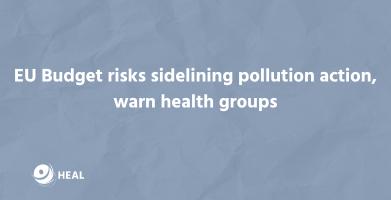In 2025, HEAL welcomed several new organisations into its international network of over 70 members committed to advancing health through environmental action. These new members bring valuable expertise in public health, environmental justice, and sustainable policy, further strengthening the capacity of the alliance to help face the challenges from biodiversity loss, pollution and climate change. Learn more about their missions and work below.
In a key vote on amendments to the General Food Law today, Members of European Parliament made significant steps in making sure data used in decisions on food safety is made publicly available.
A majority of MEPs agreed the General Food Law – the founding legal text of the European Food Safety Authority (EFSA) – should be revised in order to oblige close to all data relevant for environmental and health protection underpinning EFSA evaluations are made public. At the moment, EFSA only provides summaries of these industry studies, making it impossible for independent scientists, civil society and citizens to properly scrutinise them.
The vast majority of amendments tabled by MEP Renate Sommer did not pass the vote and Ms Sommer as a result withdrew her name from the report and resigned as Rapporteur. These amendments included the deletion of the overriding public interest, a widening of the scope of confidentiality on industry data, an obligation for EFSA to prove that dissemination of data does not harm business interests, and a delay to the time of publication of EFSA conclusions [1]. If adopted, these amendments would have annulled the European Commission’s intentions to increase transparency in this field.
“Today, the European Parliament has shown it stands for the right of EU citizens, independent scientists and civil society to know how decisions related to food safety can potentially impact our health and the environment”, says Sophie Perroud, Policy Coordinator at the Health and Environment Alliance (HEAL). “Now all EU institutions have to swiftly start negotiations and finalise putting words into action before the next EU elections”.
The European Parliament and the Council are expected to be ready to shortly start negotiations on revisions to the General Food Law in trialogue meetings.
Background
In 2017, more than one million Europeans asked the European Commission to ban glyphosate and to ensure the publication of all industry-funded studies used to back up regulatory decisions on pesticides [2].
In response, the Commission proposed a legislative reform [3] that aims to oblige the European Food Safety Authority (EFSA) to proactively publish all studies that are submitted by companies when they request EU market authorisation for their products. Organisers of the European Citizens’ Initiative ‘Stop Glyphosate’ – which HEAL belongs to – have previously welcomed the proposal [4].
Members of the EU Parliament Environment, Public Health and Food Safety Committee voted on 29 November to revise the General Food Law [5].



